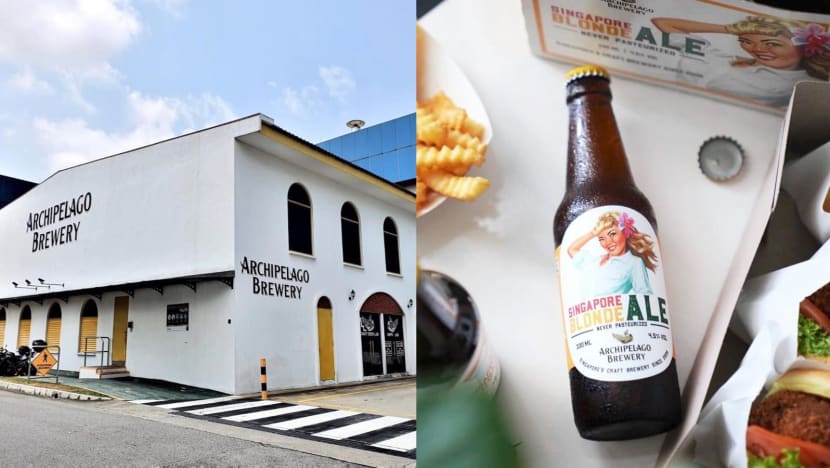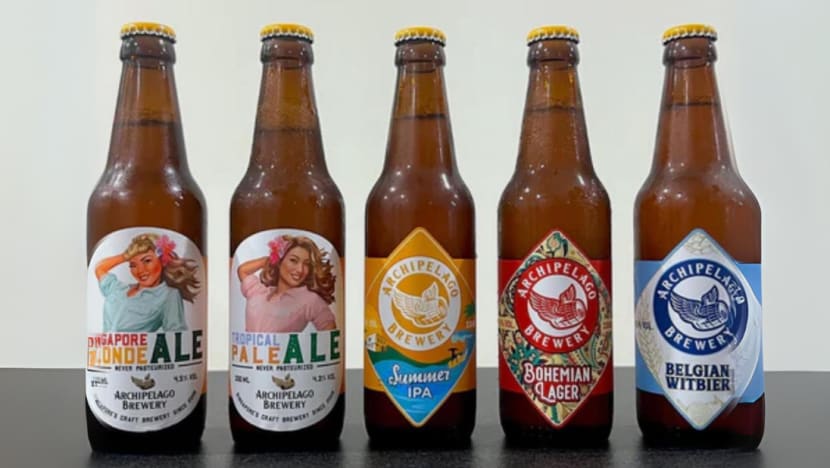Commentary: Trouble brewing for craft beer market as Singapore’s Archipelago bows out
The shutdown of Singapore brewery Archipelago reflects economic struggles in the industry and difficulties appealing to the choosy craft beer customer, says Christian Barker.

Composite photo of Archipelago Brewery in Tuas and a bottle of its Singapore Blond Ale (Photos: Facebook/Archipelago Brewery)

This audio is generated by an AI tool.
SINGAPORE: Local craft beer brewery Archipelago has fallen victim to what some commentators are calling the “beerpocalypse”. The brand, owned by Asia Pacific Breweries (APB) Singapore, will cease operations at the end of June.
For craft beer brewers around the world, these are trying times. In 2023, a staggering 418 breweries in the United States were shuttered, while in Britain, 52 declared insolvency.
Established in 1933, Archipelago is Singapore’s second-oldest brewery, originally situated near Alexandra Brickworks. After the brand lay dormant for many years, in 2006 Archipelago was given a new lease of life as APB’s craft brewing arm. APB produces beers such as Tiger, Anchor and the local licensed version of Heineken.
However, APB’s owner Heineken has decided to pull the plug on the artisanal brewery after 18 years, citing a desire to streamline their portfolio amid “declining craft beer market realities and high operational costs”.
These pressures include the toll taken by conflict in Eastern Europe - Ukraine has historically been a major source of wheat and barley, key components in beer - and inflation, driving up the price of everything from ingredients and packaging to shipping.
Rising interest rates are also impacting brewers who have borrowed to fund their business or acquire property, while cost-of-living pressures are decreasing demand. With diminished discretionary spending, people are simply going to the bar less, and may find mainstream beer at S$15 (US$11.10) per six-pack more appealing than niche ales costing S$15 per pint or more.
CORPORATE-OWNED CRAFT BEER
One of the main reasons drinkers gravitate to craft beer and are willing to pay higher prices is the sense that they’re consuming an independent, artisanal product - not an industrial beverage churned out by major breweries.
Despite being made with great care by a small team of passionate brewers, Archipelago likely suffered from its association with APB, maker of mass-market beers.
“There is a bit of a backlash against craft beer brands that are owned by big companies,” Daniel Goh, one of the founders of Chinatown craft beer purveyor Smith Street Taps, told me.
“People think, why should I drink that (corporate-owned) craft beer, when they are plenty of perfectly viable, independent craft beer alternatives the market has to offer?”
In Mr Goh’s view, consumers will gravitate to supporting independent, Singaporean-owned breweries such as Brewlander, Alive and Brewerkz. He has observed a similar anti-corporate sentiment affecting Australian craft breweries Stone & Wood and Little Creatures. Both were acquired by Lion, the beer giant that produces mass-market Australian beers including XXXX and Tooheys.
When a craft brewery falls under the control of a large corporation, often the “bean counters” will take over, Mr Goh said, and suddenly, “you’re not chasing a vision - you’re chasing numbers. That’s a very different approach.”
LACKING IN INTERNATIONAL APPEAL
In this country, we drink less than our regional neighbours. By APB’s estimates, annual per capita consumption of beer in Singapore is around 24L, compared to an average of 50L in Cambodia or Thailand, and 60L in Vietnam.
Roughly 3 per cent of the beer consumed locally is craft beer. Consequently, exports are an important element in a Singaporean craft beer’s success.
Archipelago, however, failed to gain traction internationally. The brand started out producing varieties like Straits Pale and Traders Brown Ale that acknowledged their Singaporean provenance.
However, in recent years, more of Archipelago’s brews seem designed to look European (such as Bohemian Lager, Belgian Witbier, Irish Ale) or Australian (Summer IPA). Even the Singapore Blonde Ale, with its label depicting a pin-up girl, appears American.
This is ironic given the success Tiger has had in the international market by leaning into its Singaporean origins. Learning from its big brother in this regard could have been an area where Archipelago benefitted, rather than suffered, from its corporate associations.

Without a strong branding proposition that is recognisable as “uniquely Singaporean”, Archipelago may have lost its attractiveness to an international audience seeking a taste of this country.
To craft beer enthusiasts, Archipelago Brewery’s products may have carried the high pricing of craft beer, but not the self-made and distinct identity they associate with artisanal beverages.
A craft beer lives or dies on pride in its unique origins, a sense of independence and authentic craftsmanship. While Archipelago had that last factor on lock, its failings in the other two areas proved fatal.
Christian Barker is a Singapore-based journalist and editor who covers luxury, travel, business, culture and men’s style.

















